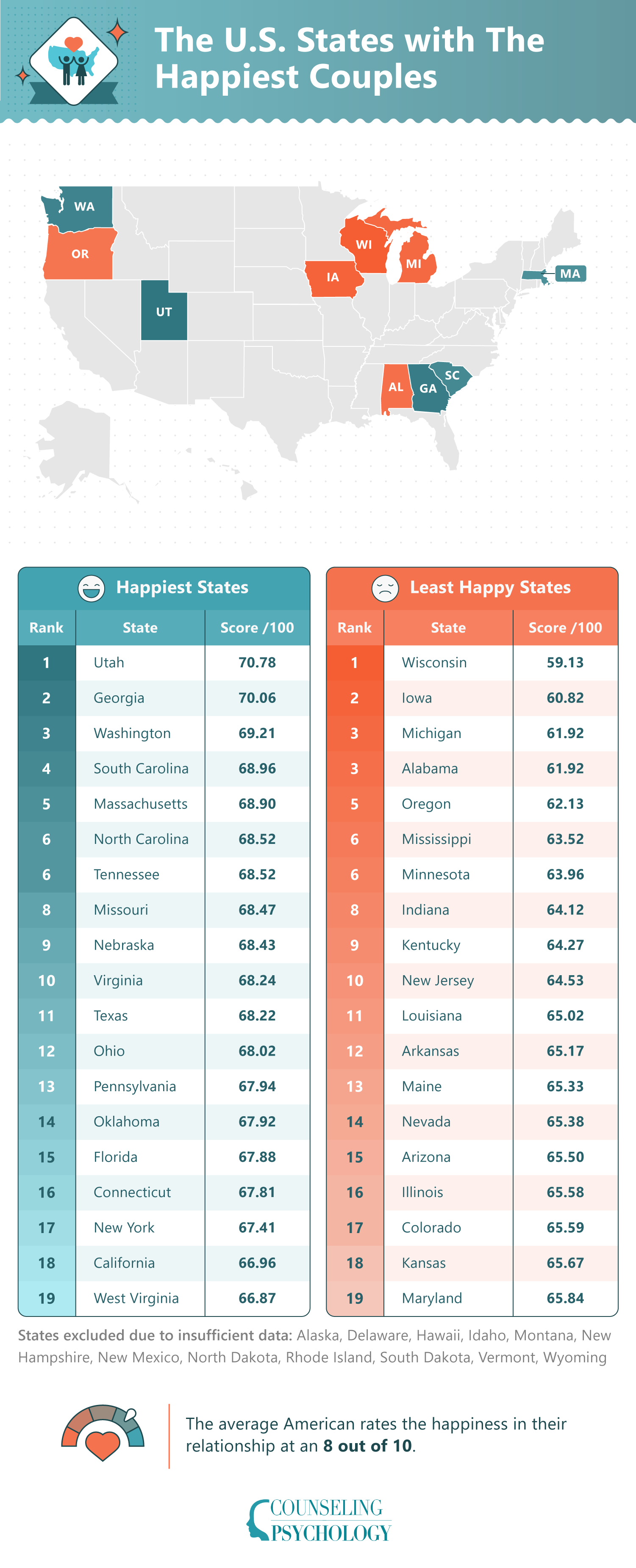Couples in These U.S. States Have the Happiest Relationships

In the intricate tapestry of romantic relationships, threads of disagreements are woven in. But when do these threads fray, risking the entire fabric? And how do they color the overall happiness of a partnership?
We examined the romantic lives of Americans, surveying nearly 2,000 individuals in relationships and scoring their responses to create a ranked list of the states with the happiest couples.
The results pinpointed regions in the U.S. where the happiest couples reside, contrasted with those facing challenges, to illuminate the factors that fortify or fracture a romantic relationship.
Key Findings
- The happiest couples live in Utah, Georgia, and Washington.
- The least happy couples live in Wisconsin, Iowa, and Michigan.
- Generation Z (86%) reports being the happiest in their relationships.
- The average American rates their romantic happiness at an 8 out of 10.
- Communication is the #1 issue couples in America face.

How We Measured Relationship Happiness Per State
An impressive 84% of Americans report genuinely content in their romantic relationships. Our survey, which rates happiness on a 100-point scale, examined various dimensions of romantic happiness — from family relations to frequency of shared laughter.
Though no state scored above 71, suggesting that even the happiest relationships have room for improvement, the average American still rates their happiness at 8 out of 10.
Generational insights from our data reveal some intriguing patterns. Gen Z leads the happiness index, with 86% reporting relationship satisfaction, offering a bright perspective on the newest generation of romantic partnerships.
Not far behind are boomers at 84%, followed by millennials at 83%. Gen X lags slightly behind with a 79% happiness rate but still demonstrates a generally upbeat outlook on their relationships.
The Happiest Couples Live in Utah
Utah emerges as the state with the most content couples, boasting a happiness score of 70.78 out of 100. Not only does Utah top the list, but couples in the state also report the shortest duration of disagreements — an average of just six hours per week disagreeing. Additionally, Utah couples rank as the third most spontaneous, with 80% reporting impromptu activities.
Close behind Utah, Georgia secures a happiness score of 70.6, buoyed by a heartwarming 96% of couples who laugh together at least weekly. Georgians also have the highest frequency of deep, meaningful conversations, with 84% engaging weekly.
Washington State rounds out the top three with a score of 69.21. Couples in Washington are the second most spontaneous and the most laughter-filled — 98% report laughing together at least once a week.
South Carolina, which has a happiness score of 68.96, diverges from the trend in an interesting way. While 91% of South Carolinians report being truly happy in their relationship, the state ranks only 24th in the frequency of deep, meaningful weekly conversations.
Massachusetts completes the top five with a score of 68.90, primarily driven by 92% of couples laughing together often and 74% enjoying spontaneous activities.

Wisconsin Is Home to the Least Happy Couples
On the other end of the spectrum, Wisconsin has the least happy couples in America, with a relationship happiness score of 59.13 out of 100.
Not only are couples in Wisconsin the least spontaneous — only 57% report impromptu activities — but they also laugh the least, with a mere 3% reporting that they laugh together weekly. This stark contrast to states like Utah and Georgia, where spontaneity and laughter are cornerstones of relationship happiness, suggests that these elements play a pivotal role in overall satisfaction.
Iowa trails closely behind Wisconsin with a score of 60.82, marred by long-lasting disagreements that average 19 hours per week— second only to Alabama's staggering 25-hour lengthy disputes. Michigan and Alabama, scoring 61.92, seem to suffer from a lack of deep, meaningful conversations. Only 63% of Michigan couples report engaging in such talks. Additionally, Oregon rounds out the bottom five with a score of 62.13, its primary shortcoming being that only 71% of its couples report being "truly happy" — the lowest of any state.
Like Texas and New York, states that fall near the middle display a complex picture. While Texas is middling in more dimensions, ranging from monthly time spent on hobbies together to the frequency of deep conversations, it lags significantly in laughter, ranking 35th out of 38.
Conversely, New York couples engage in the least deep conversations (46%), but 74% still partake in spontaneous activities. Illinois stands out as an outlier, being the most spontaneous state at 86% but only ranking 10th in self-reported happiness.
Couples in the Happiest States Have This One Thing in Common
Regarding the secret sauce for relationship happiness, communication tops the list as the number one quality Americans value. Notably, this focus on communication is especially prevalent in the top three happiest states, reinforcing its pivotal role in romantic well-being.
Interestingly, California diverges as the lone state that prioritizes understanding, while Iowa stands out for valuing kindness the most.
The importance of communication appears to cut across generational lines but with some nuances. While Gen Z and millennials concur that communication is paramount, Gen X leans toward respect, and boomers highlight honesty as the cornerstone of a happy relationship.
Our survey also provided insights into how couples spend their time. On average, American couples dedicate 17 hours per week to quality time together, with nearly half (49%) engaging in deep, meaningful conversations weekly. In addition, most couples (51%) share hobbies weekly, adding another layer to the bonds contributing to happiness.

Americans Say Their #1 Strength Is Shared Values
87% of those who describe themselves as "truly happy" note that they experience disagreements with their partner monthly, suggesting that some level of conflict is expected in a healthy relationship.
Spontaneity also seems to be a key component of happiness, with nearly one in four American couples engaging in spontaneous activities frequently. 77% of these spontaneity-loving couples also report being truly happy in their relationships.
Another surprising happiness indicator is the role of external relationships. Among couples who reported being truly happy, 92% said they liked their partner's family. Regarding generational stats for all couples, baby boomers lead this metric at 45%, followed by Gen Z, millennials at 43%, and Gen X at 39%. Interestingly, women (44%) are slightly more inclined to like their partner's family than men (39%).
The trend of external relationships contributing to internal happiness continues when considering friendships. Among those who reported being truly happy in their relationships, an overwhelming 97% of couples who appreciate their partner's friends also classify themselves as truly happy. Once again, when analyzing generational stats for all couples, boomers top the chart at 37%, with millennials not far behind at 36%. Gen X (34%) and Gen Z (33%) trail slightly, but the overall picture shows that liking your partner's friends positively correlates with relationship satisfaction.

Communication Is the Double-Edged Sword of Relationships
While Americans overwhelmingly prioritize communication for a successful partnership, it's also the number one problem couples face, surpassing health and finances. This duality underscores effective communication’s complexity and critical importance in sustaining a happy relationship.
Speaking of health, both physical and mental well-being also appear to be linked to relationship happiness. Our survey indicates that one's state of health is a significant determinant of a relationship’s overall satisfaction and stability.
And it's not just current dynamics — 1 in 3 Americans admit that unresolved issues from past relationships impact their present ones. This statistic highlights the vital need for individuals to heal, learn, and grow from previous relationships to nurture their current ones better.

Understanding the nuances of relationship dynamics has never been more crucial, particularly in an era where seeking professional guidance to navigate the complexities of romantic partnerships is becoming more and more normalized.
If you're intrigued by the intricacies of human behavior and relationships and wish to guide others toward healthier and happier connections, learning how to become a counselor can be a rewarding next step. Many choose the marriage and family route through MFT degrees.
Counseling allows you to assist others in forming healthier, happier relationships. It offers an unparalleled opportunity to dive deep into the contributing factors that either make a relationship thrive or cause it to falter.
Counselors play a vital role in enhancing relationship happiness by facilitating more effective communication, helping to unpack emotional baggage, and offering strategies to navigate challenges. It's a role that calls for empathy and expertise, and it promises to make more fulfilling relationships accessible for all.
Methodology
On August 14–21, we surveyed 1,987 Americans about the happiness in their current relationship. Respondents ranged in age from 18 to 76 years old and were 51% female, 47% male, and 2% nonbinary.
We scored American couples on 16 questions to give each state a "romantic happiness score" out of 100. States excluded due to insufficient data: Alaska, Delaware, Hawaii, Idaho, Montana, New Hampshire, New Mexico, North Dakota, Rhode Island, South Dakota, Vermont, and Wyoming.



